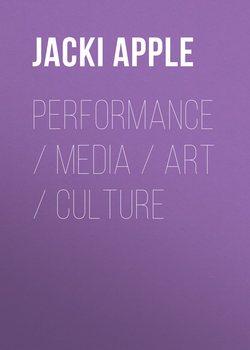Читать книгу Performance / Media / Art / Culture - Jacki Apple - Страница 12
На сайте Литреса книга снята с продажи.
Psycho-Opera (1987)
ОглавлениеThe way the media has insidiously infiltrated every aspect of our post-industrial, image-saturated, information-overloading lives and replaced the reality of direct experience with replication, a simulation, turning us into voyeuristic “consumers,” has been the dominant subject matter of art in the 1980s. Much of this art simulates its subject matter, appropriates its imagery and assumes a posture of irony or criticism. Unfortunately the guise of “deconstruction” often ends up as just another academic intellectual exercise mouthing familiar rhetoric in a cul de sac, doing little more than remind us that we are trapped in a world of Quaker Oats boxes holding up Quaker Oats boxes ad infinitum.
Favoring theory over emotional content, art rarely approaches the subject of the media on a visceral or psychological level. The latter approach is what made Psycho-Opera such a startlingly powerful and unusual theatrical experience. Conceived and directed by David Schweizer, written and performed by John Fleck, with media-slick video by Norman Yonemoto, and a seamless, movie-style soundtrack composed and performed by Steve Moshier, it was a sensory assault.
In Psycho-Opera the media, namely TV, was “personified.” It loomed over us like an android Golem. It entered our brains like a worm in the ear, inhabited our bodies, spoke through our tongues, flicking in and out of the collective mouth, locked in a kiss. And when it fucked us, was it rape, seduction or masturbation? We were in love with our captor, the parent/child who was none other than the projection of our own psyches, a kind of electronic manifestation of our unconscious.
Where does the body and the brain of one individual end and another begin? The collective body and its schizoid brain stood before us having a psychotic seizure, a freak-out, a breakdown. It was America embodied in the man/woman Leyland (John Fleck) who was hallucinating. The boundary line between fact and fiction, the real and imagined, had dissolved. History was reduced to a parade of celebrity personae, moments remembered from movies. The newscaster’s headlines collapsed and blended into each other in fractured sentences without meaning or syntax, as if a disinterested God was sitting up in the cosmos with his remote randomly switching channels in a frenetic search for reruns of I Love Lucy.
The central event that triggered our societal breakdown was the assassination of John F. Kennedy, a live TV spectacle that marked the coming of age of the age of TV. It was the end of innocence, a psychic “rape” in which Fleck cast Marilyn Monroe and Lee Harvey Oswald as the unlikely lovers, victims and perpetrators, sacrificial icons.
Fleck played Leyland to the histrionic hilt, flailing about Sam Hale’s pristine, ominously antiseptic set with its circuit-printed floor and TV-headed robots manipulated by technicians in hospital attire. He switched effortlessly from male to female personae, singing in an operatic falsetto, feverishly wrenching clothes and gyrating lasciviously while engaging in a dialogue with the multiple personalities who inhabited his psyche via the TV monitors. They included his mother, father, psychiatrist, an evangelical preacher, a news anchorman, a movie star, politician, criminal, etc. In each he sought salvation, liberation, love. None was to be found.
The solution to his schizophrenic, paranoid, manic-depressive rantings should be obvious to all of us since it has already been implemented in this decade. They gave him a lobotomy. He returned, “normalized,” a Reagan-era brainwashed Mr. Feel Good, a certified amnesiac, a Yuppie in a suit, a jargon-spouting hustler with a smile and a wave, a well-packaged media product. Everything is just fine! Right, folks!
Psycho-Opera was a farcical tragedy, a personal history that was a parable, an “opera” for our time.
